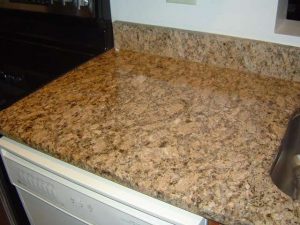Silestone vs Granite Countertop Advantages and Disadvantages
By Mark J. Donovan
|
|
In this video Mark Donovan of HomeAdditionPlus.com discusses granite versus silestone countertop differences, as well as the advantages and disadvantages of each.
Granite and Silestone countertops are commonly seen in higher end homes. They represent the pinnacle of the countertop market and are typically used in kitchens, bathrooms, and bar areas. Granite and Silestone are also used for floor applications.
Granite countertops are 100% natural and come in an infinite amount of colors, shades and tints. Silestone countertops are manufactured using a quartz aggregate and epoxy resins and is available in several dozen colors. Both Silestone and granite countertops are extremely durable and require little to no maintenance.
| Granite vs Silestone Countertop Manufacture Process
Granite is a ubiquitous natural stone that is found throughout the world. Granite is quarried and cut into large slabs. The slabs are then shipped to various granite countertop manufacturers around the globe. The granite slabs are then cut to specific customer requirements and polished. |
 |
They are then shipped to the jobsite where they are installed by professional granite countertop installers. In some cases the granite slabs are cut into tile pieces with thinner thicknesses.
Silestone countertops on the other hand are fabricated using quartz aggregate and epoxy resins. The quartz aggregate is mixed with the epoxy resin and then formed into various sheet sizes. Once hardened the Silestone is then cut to specific customer requirements.
Granite Countertop Advantages and Disadvantages
Granite is a natural product that has been used by man for eons. Granite countertops are highly durable. The only concern is that some types of granite are susceptible to staining. However, if the granite countertops are sealed periodically the risk of staining is mitigated significantly.
| Granite countertops are also extremely hard and thus will not scratch. Granite countertops will also not scorch if a hot pan or item is placed on them.
Though granite countertops are expensive they are actually a bit less expensive than Silestone countertops. Also, granite countertops can be purchased in two thicknesses, as well as in tiles. |
|
Thus there are price points for nearly any consumer who really wants to see granite countertops in their kitchen or bathroom.
Silestone Countertop Advantages and Disadvantages
Silestone is manufactured with a natural product, quartz stone. Thus it is almost as natural a product as Granite.
Due to the quartz, Silestone sparkles when light is applied directly over it, thus giving it a unique and beautiful look.
Silestone is also extremely durable and will not scratch or stain. However, due to the fact that resin is used as a binder in the manufacturing of it, Silestone can potentially scorch if a hot pan or item is placed on it for too long.
Unlike granite there is no maintenance or sealing required with Silestone countertops. Silestone is also less likely to chip or crack, compared to granite countertops.
For help on your kitchen remodeling project, see my Kitchen Remodeling Bid Sheet. The Kitchen Remodeling Bid Sheet provides a request for quote checklist section that you can provide to prospective kitchen remodeling contractors. It also includes a comprehensive kitchen remodeling cost breakdown table, in Microsoft Excel format, that allows the contractor to include his projected remodeling costs for every phase of the project.
Related Information
- Granite Sealers
- How to Plan a Kitchen Remodel Video
- Applying Granite Sealers to Kitchen Counter-tops
Additional Kitchen Remodeling Design Resources
 |
Get Free Kitchen Remodeling Price Quotes with No Obligation!
Fill out our 3-5 minute quick and easy form, and receive a free price quote on kitchen remodeling from one of our prescreened and licensed kitchen remodeling contractors. This process is free and there is no obligation to continue once you receive your kitchen renovation price estimate.
